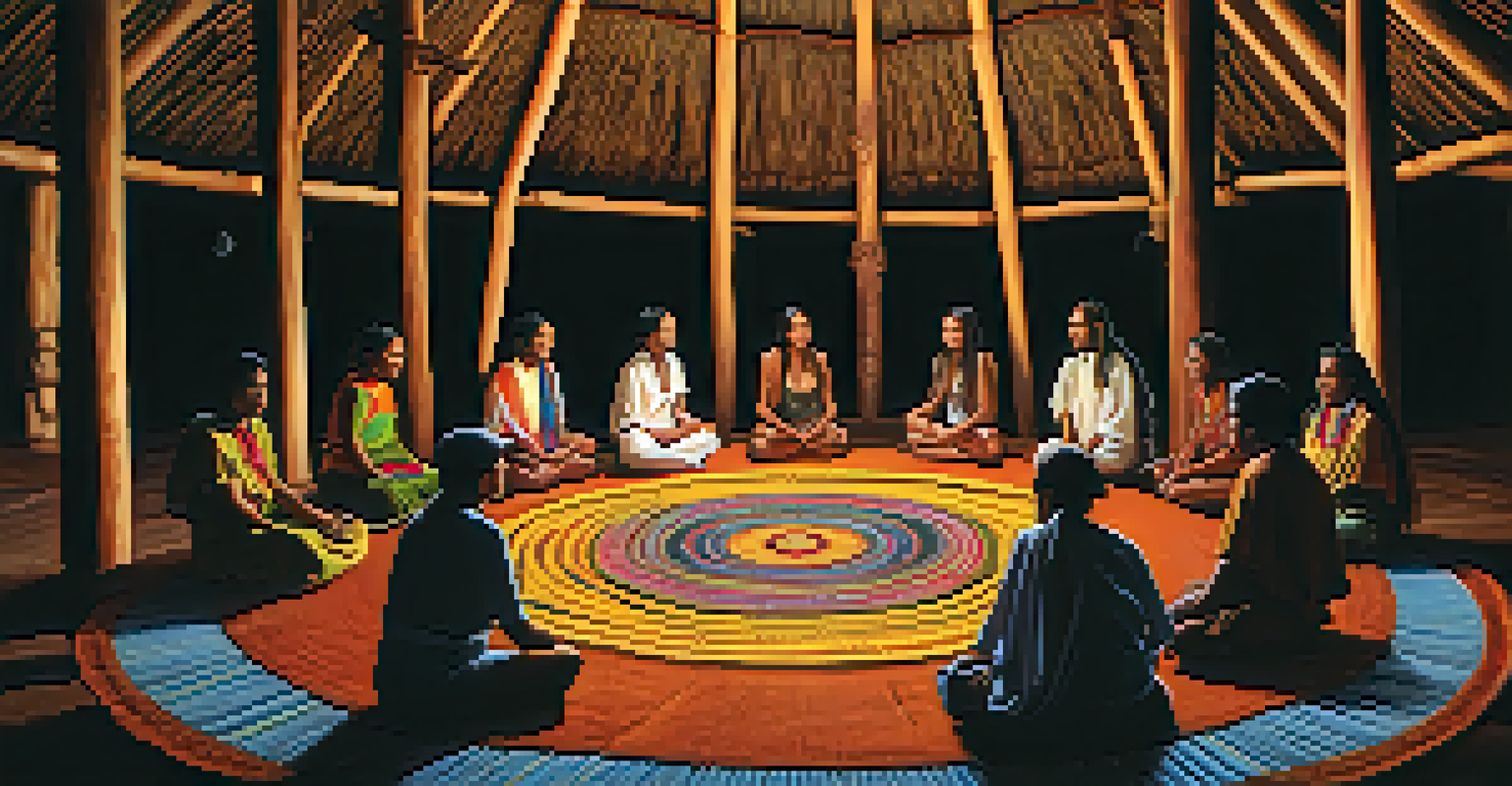Exploring Ayahuasca's Role in Personal Transformation Journeys

What is Ayahuasca and Its Historical Context
Ayahuasca is a powerful plant-based brew traditionally used by indigenous tribes in the Amazon. It is made from the Banisteriopsis caapi vine and other plants, creating a potent hallucinogenic experience. Historically, shamans have utilized Ayahuasca for healing, divination, and deep spiritual insights.
The experience of Ayahuasca can be a bridge to profound insights and transformation, revealing the deepest layers of our consciousness.
This ancient practice has been passed down through generations, where it is revered for its transformative effects. The brew is not just a recreational substance; it is deeply woven into the cultural and spiritual fabric of many South American communities. Understanding its roots helps us grasp its significance in personal transformation.
Today, Ayahuasca has garnered attention worldwide, attracting individuals seeking profound self-discovery and healing. As more people turn to it for guidance, it’s essential to consider the cultural context and respect its origins while exploring its potential benefits.
The Science Behind Ayahuasca's Effects
Ayahuasca contains DMT (dimethyltryptamine), a powerful psychedelic that affects serotonin receptors in the brain. This interaction can lead to altered perceptions, vivid hallucinations, and profound emotional experiences. Understanding the science helps demystify why so many people report transformative experiences.

Research suggests that Ayahuasca can promote neuroplasticity, allowing the brain to create new pathways and facilitate healing. This can be particularly beneficial for those grappling with trauma, anxiety, or depression. As a result, participants often find themselves confronting deep-seated issues during their journeys.
Ayahuasca's Cultural Significance
Ayahuasca is deeply rooted in indigenous traditions, serving as a tool for healing and spiritual insight.
Moreover, studies have shown that Ayahuasca can enhance emotional regulation and empathy. By fostering a deeper connection to oneself and others, it lays the groundwork for significant personal transformation, making it a compelling option for those on a healing journey.
Personal Transformation Through Ayahuasca Experiences
Many individuals who undergo Ayahuasca ceremonies report profound changes in their perspectives and behaviors. Participants often emerge from these experiences with a renewed sense of purpose and clarity. This transformation can lead to healthier relationships and a more fulfilling life.
To understand Ayahuasca is to understand the vastness of the human spirit and its capacity for healing and growth.
For instance, someone struggling with addiction might find that their experience exposes the root causes of their behavior, allowing them to confront and heal those issues. Such breakthroughs can be life-changing, leading to lasting recovery and personal growth.
These transformative journeys are often accompanied by intense emotional purging, which can manifest as crying, laughter, or even physical sickness. While it can be uncomfortable, many find this release to be a necessary step in their healing process, marking the beginning of a new chapter.
The Role of Integration After Ayahuasca Retreats
After an Ayahuasca experience, the integration process is crucial for turning insights into actionable change. Participants often feel a sense of elation or clarity but may struggle to apply these revelations in their daily lives. Embracing this phase can enhance the transformative effects of the journey.
Integration may involve therapy, journaling, or participating in support groups where individuals share their experiences. These practices help solidify the lessons learned and provide a roadmap for continued growth. It’s about taking the profound insights from Ayahuasca and weaving them into the fabric of everyday life.
The Importance of Integration
Post-ceremony integration is crucial for turning insights gained from Ayahuasca into meaningful life changes.
Additionally, having a supportive community during this time can significantly impact one’s ability to integrate. Sharing stories and receiving guidance can help individuals navigate the complexities of their transformations, making the journey feel less isolating.
Cultural Appropriation and Ethical Considerations
As Ayahuasca gains popularity outside its traditional context, discussions around cultural appropriation become essential. Many indigenous communities are concerned that the commercialization of Ayahuasca undermines their cultural heritage. It’s vital for newcomers to approach these experiences with respect and awareness.
Acknowledging the origins of Ayahuasca and the wisdom of the indigenous peoples who have used it for centuries is crucial. Participating in ceremonies led by qualified shamans can ensure a respectful approach. Such practices honor the traditions and knowledge that have been cultivated over generations.
Moreover, supporting indigenous communities through ethical tourism and fair compensation can help bridge the gap between cultures. By fostering mutual respect, we can create a more sustainable and respectful relationship with the Ayahuasca experience.
Potential Risks and Challenges of Ayahuasca Use
While many find Ayahuasca transformative, it’s essential to recognize that it’s not for everyone. The brew can elicit intense psychological experiences that might be overwhelming, especially for individuals with certain mental health conditions. Consulting with a healthcare professional beforehand is a wise step.
Additionally, there are physical risks associated with Ayahuasca, including nausea and vomiting, which are often part of the experience. Although participants often view these symptoms as purging, it's important to be prepared for the physical aspects of the journey. This preparation can help set realistic expectations.
Risks of Ayahuasca Use
While transformative for many, Ayahuasca can pose psychological and physical risks, particularly for those with certain mental health conditions.
Lastly, the setting in which Ayahuasca is consumed plays a crucial role in the experience. A safe, supportive environment can enhance the journey, while a negative setting can lead to distressing experiences. Finding reputable retreat centers that prioritize participant safety is vital.
Finding the Right Ayahuasca Retreat for You
Choosing the right Ayahuasca retreat is a significant step in the personal transformation journey. With countless options available, it’s essential to do thorough research to find a place that aligns with your values and needs. Look for retreats that emphasize safety, ethical practices, and participant support.
Reading reviews and testimonials can provide insight into the experiences of others, helping you make an informed decision. Moreover, consider the qualifications of the facilitators and their approach to the Ayahuasca experience. A knowledgeable and compassionate guide can enhance your journey.

Lastly, trust your intuition when selecting a retreat. If something feels off or doesn't resonate, it’s okay to keep searching. The right environment can make all the difference in your Ayahuasca experience and subsequent personal transformation.